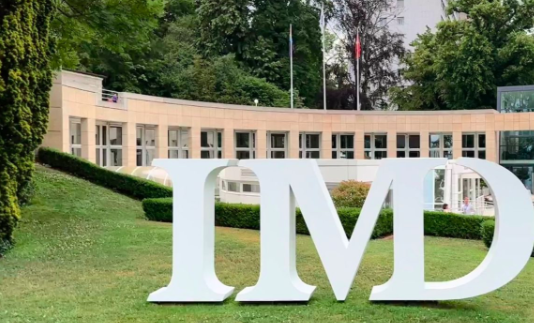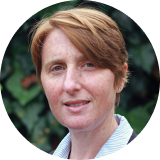In IMD’s top-ranked MBA program, the unique learning experiences begin before applicants are even admitted.
Candidates submit the usual application form, transcripts, test scores, and a recommendation letter. Top applicants are then invited to take part in an assessment day, held either online or in person.
It’s more or less a full day that simulates MBA program activities. In addition to a brief individual interview, groups of six to 10 applicants analyze and present a case, present a position on a challenging issue, and take part in other sessions modeled on course experiences. “It’s fast-paced, with lots of things happening. “We want to see applicants in action, how they behave in a group setting, how they behave under pressure, how they lead, how they listen to others,” explains Anna Farrus, IMD’s Director of MBA Recruitment and Admissions.
At the same time, applicants get “a very good indication of what they will experience in the first six months of the program.” Farrus said. “You cannot hide in our MBA program. If you are not comfortable in articulating your ideas, you are going to be cold-called,” she said.
Participants also get to know and connect with potential classmates and receive individualized feedback from the staff who observe and assess them during activities. Assessment days are “such a learning experience. I often receive emails and messages on LinkedIn from applicants who are grateful for the experience even if they are not admitted.”
IMD also offers a second admissions pathway, with a simplified applications process and a similar Challenge Assessment Day, where invited participants team up to analyze a business problem and present a solution. Some are then invited to interview, and participants are filtered down until ultimately, the top candidate wins a place in the class and a scholarship.
This process allows students of different professional academic backgrounds to compete their way into the class. There are Challenge Assessment Days for women, for younger applicants with less career experience, and one specifically for Danes that provides a full 97,500-franc scholarship.
This unique experiential assessment is possible only because of another feature that sets IMD apart: a small class size that allows for personalized attention. With just 100 to 120 students, the faculty-to-student ratio is high. The staff gets to know each student and helps them through their MBA journey, producing a program that is highly individualized to interests and needs. “We don’t produce a program that is the same for everyone. It’s very personalized,” Farrus says.
Experiential Learning and Self Knowledge
IMD’s strong focus on leadership development is evident in its full name: the International Institute for Management Development. Leadership is emphasized on a level Farrus says she hasn’t seen elsewhere. “It’s about leaders who are self-aware, so we give them access to 20 hours of psychoanalysis. It’s completely confidential; the relationship is strictly between the student and the analyst.” The point is for students to get to know themselves well, “because we think as a leader if you don’t know yourself, how can you know others, how you respond, what triggers you? That self-knowledge is super important.”
The MBA program features what Farrus calls “an extremely practical, super hands-on approach.” About 40 percent of course content is project-based. Experiential learning begins at the very start of the program. While they are taking their first courses in business fundamentals, they are also assigned to work with a start-up company in Switzerland, addressing an aspect of the firm’s development.
This provides early, immersive entrepreneurial experience, which students welcome. Like many business schools, IMD is seeing more and more of their students graduate and launch their own ventures.
IMD’s leadership has also strengthened its emphasis on sustainability; the program begins with a weekend in the Alps that features sessions on the subject, and sustainability is woven through core courses because it’s a concern of every business today.
Both the emphasis on leadership and the practical hands-on focus are rooted in IMD’s unique history. Originally founded by business executives, “today we call it a university institute that was born from the industry,” says Farrus. “We still work very closely with companies, especially in Switzerland,” but the institute’s reach is now global, with 40 nationalities represented in a typical MBA class on campuses in Lausanne and an offering of Executive Education in Singapore.
Getting In
IMD offers a total of seven application deadlines for its MBA program. Because the program starts in January, the cycle starts early with admissions deadlines for the traditional admissions pathway on January 15, February 15, April 15 and June 15. Remaining deadlines for 2024 admission are August 15, September 15, and October 15 . The Challenge deadline for young leaders was May 15. The Women Leaders Challenge deadline is July 15, and the deadline is September 1 for the CO-RO scholarship challenge for Danes.
All applicants are automatically considered for scholarships, and many are available, based on need, merit, background and other factors. One notably generous opportunity is the Backpack scholarship for women, which provides a full scholarship and living expenses for women who face difficulties because of where they live or specific challenges they have faced.
“We don’t want anyone not to be able to come to IMD because they are missing 5,000 francs,” Farrus notes.
“And the last thing I would say to potential applicants is, we’re here to help. I root for candidates; I want everyone to be successful. If you have any questions, any doubts, reach out and ask me or one of my team.”
Let’s Get You In
At Fortuna Admissions, we’re a dream team of former admissions directors and seasoned MBA coaches from the world’s top business schools. We specialize in helping applicants craft compelling stories and maximize every part of the application process.
Book a free consultation to assess your candidacy and find out how we can help you get into your dream MBA program.




